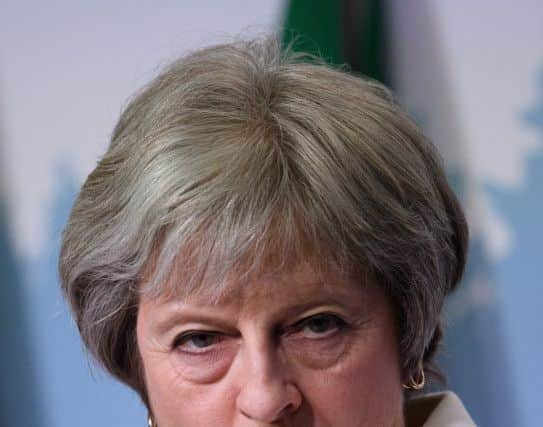May strikes deal with pro-EU rebels ahead of crunch Brexit votes
The deal avoids what could have been a damaging defeat over the customs union as MPs begin debating amendments imposed on the EU Withdrawal Bill by the House of Lords today.
The government still faces a knife-edge vote on how much power the Commons will have over the final Brexit deal.
Advertisement
Hide AdAdvertisement
Hide AdMPs will also draw a line under the long-running row about devolved powers after Brexit when time finally runs out for Edinburgh and London to reach a deal before the bill is signed off.


Addressing a meeting of the backbench 1922 committee yesterday evening, the Prime Minister told MPs to consider the signal that would be sent to Brussels if the government was defeated, and asked potential rebels not to undermine her negotiating position.
Pro-EU Tories have backed off amid fears Mrs May could be fatally damaged by defeat, opening the way for a hardline Brexiteer to take over at the top of the party.
A deal between the two factions was brokered last night, with Brexiteer Jacob Reed-Mogg and former minister Nicky Morgan putting their names to an amendment committing to a new “customs arrangement”, replacing language on staying in the customs union.
Conservative whips have also offered MPs a 28-day ‘cooling off’ period if the Commons rejects the final Brexit deal in a ‘meaningful vote’ promised by the government, during which ministers would have to explain their next steps.
Addressing her MPs, Mrs May said: “We must think about the message Parliament will send to the European Union this week.
“I am trying to negotiate the best deal for Britain. I am confident I can get a deal that allows us to strike our own trade deals while having a border with the EU which is as frictionless as possible.
“But if the Lords amendments are allowed to stand, that negotiating position will be undermined.”
Advertisement
Hide AdAdvertisement
Hide AdMeanwhile, Jeremy Corbyn is facing a possible rebellion of his own, with the Labour MP Ian Murray calling on fellow MPs to back a bid to keep the UK in the single market through membership of the European Economic Area after Brexit.
Writing in the Scotsman, Mr Murray said it was “deeply troubling” that the Labour front bench was refusing to support membership of the EEA and warned future generations would “ask us why we failed to act”.
Analysis of the Labour vote in the 2017 general election published last week has found that Remain voters outnumber pro-EU voters by a factor of more than 2:1.
The Edinburgh South MP added that he was “confident we can smooth some of the particularly rough edges” of the Withdrawal Bill, and said he believed there were enough Conservative rebels to keep the UK in the customs union.
Ahead of the 1922 meeting, Conservative Remain campaigner Sarah Wollaston called for “further concessions” on the customs union.
The Totnes MP said she was “minded” to rebel to support a Lords amendment on giving Parliament a meaningful vote on an exit deal, telling the BBC: “We would like to see further concessions on the amendment on the customs union because it is just a very sensible amendment that says keep it on the table, don’t completely rule it out.”
Senior backbencher Jacob Rees-Mogg said he expected there would be enough unity in Conservative ranks to see the Bill through.
The Brexit supporter told LBC radio on Monday that he would not expect people like pro-Remain MP Ken Clarke, who have “strong principles”, to change their minds.
Mr Clarke had urged the rebels to hold their nerve.